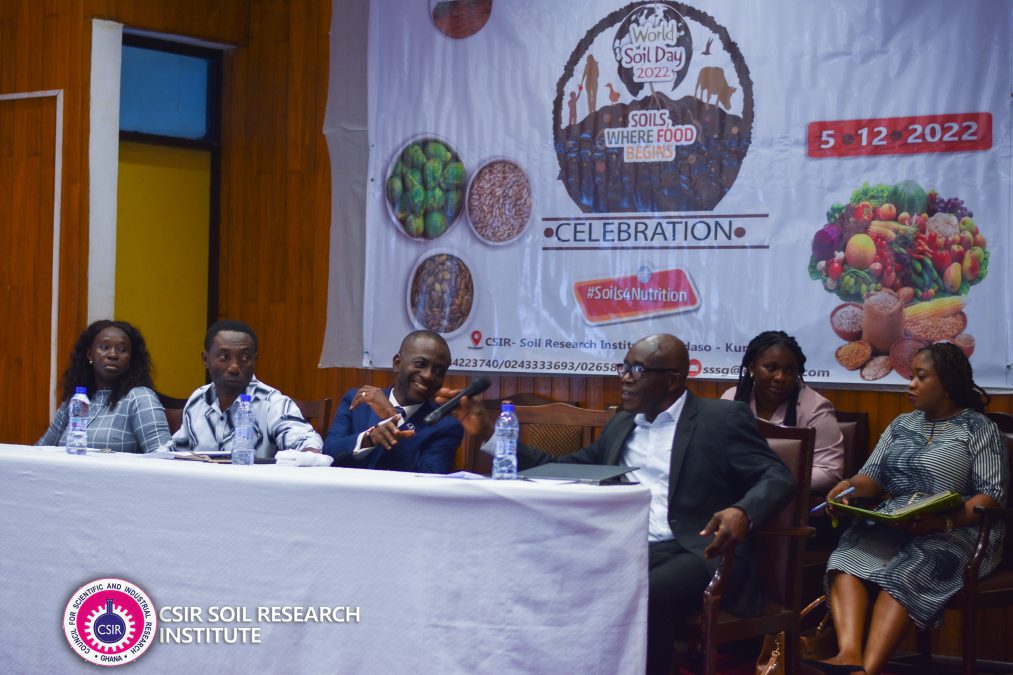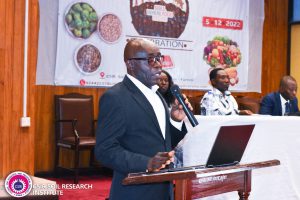SOIL SCIENCE SOCIETY OF GHANA HOLDS WORLD SOIL DAY 2022 – FOOD STARTS WITH SOILS, TREAT SOILS WELL-PROF. FENING.


The CSIR-Soil Research Institute (SRI), in collaboration with the Soil Science Society of Ghana (SSSG), has celebrated the 2022 World Soil Day at the SRI Sofernet Conference Room on Monday, December 5, 2022, with a call on stakeholders to treat the soil well because it is the foundation of all life on Earth.
World Soil Day 2022 (#WorldSoilDay) and its theme, “Soils: Where food begins” aims to raise awareness of the importance of maintaining healthy ecosystems and human well-being by addressing the growing challenges in soil management, increasing soil awareness and encouraging societies to improve soil health.
Soil nutrient loss is a major soil degradation process threatening nutrition and is recognized as being among the most important problems at a global level for food security and sustainability all around the globe.
Reverend John Manu, the Ashanti Regional Director, of the Ministry of Food and Agriculture, said the key challenge to achieving balanced soil fertility was to find a sustainable role for fertilizers in plant production.
 Prof. J.O. Fening, a former director at SRI and a Principal Research Scientist, who represented the SRI director, remarked that Ghana has about 65% of its soil depleted, saying after destroying the soil, it takes about 1000 years to bring back 1cm of the soil destroyed. He cautioned the participants and the public not to treat the soil anyhow, as food starts with the soil.
Prof. J.O. Fening, a former director at SRI and a Principal Research Scientist, who represented the SRI director, remarked that Ghana has about 65% of its soil depleted, saying after destroying the soil, it takes about 1000 years to bring back 1cm of the soil destroyed. He cautioned the participants and the public not to treat the soil anyhow, as food starts with the soil.
“Soil health is the foundation of sustainable food systems and universal food security, causing the recognition and valuation of healthy soils as a critical asset for Nutrition, Economic Development, climate change adaptation, and resilient livelihoods,” he added.
Prof. Fening called on the industrial players to support the production of soil nutrient maps to drive the blending of site-specific and nutrient-specific fertilizers.
 Dr. Francis Marthy Tetteh, Principal Research Scientist, Head, Department of Soil Resources Management, CSIR-College of Science and Technology (CCST) who spoke about Soil Fertility and Land Degradation in Sub-Saharan countries, explained that Soil fertility remains the fundamental biophysical cause for the declining per capita food production in the sub-region for the past 3 decades. He, therefore, called for consensus on Soil-Related Strategies for increasing the Food Supply.
Dr. Francis Marthy Tetteh, Principal Research Scientist, Head, Department of Soil Resources Management, CSIR-College of Science and Technology (CCST) who spoke about Soil Fertility and Land Degradation in Sub-Saharan countries, explained that Soil fertility remains the fundamental biophysical cause for the declining per capita food production in the sub-region for the past 3 decades. He, therefore, called for consensus on Soil-Related Strategies for increasing the Food Supply.
Partners and stakeholders in attendance included MoFA, Research Scientists, Representatives from the Faculty of Natural Resources Management (KNUST), and the media.